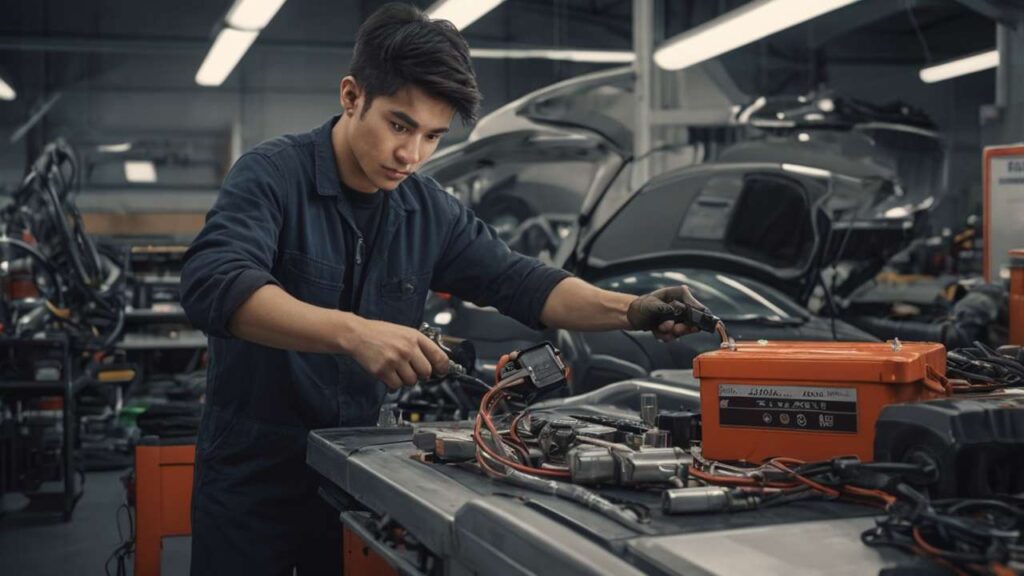Batteries are often underestimated, yet without them, both motorcycles and trucks would simply sit still, lifeless. A small piece of tech, but one that decides whether your engine roars or groans. For anyone who has faced a dead battery at the worst possible time, you know the panic—it’s frustrating, sometimes embarrassing, and can get costly real quick. And here’s the thing: motorcycle vs. truck batteries are not even close to the same league.
This comparison isn’t just about technical jargon; it’s about real-life decisions and mistakes that riders and truck owners keep repeating. Some mechanics still try to apply a “one-size-fits-all” approach, but that almost always backfires. If you’ve ever wondered why some batteries fail fast while others seem to last years, the answer lies in understanding the size, power, and unique challenges of each vehicle type.
And trust me, ignoring these differences can cause more damage than just a no-start morning. I’ve seen a friend in Raleigh, North Carolina, spend nearly $500 replacing a truck battery that wasn’t even the core issue. The alternator was weak, yet the wrong-sized battery got shoved in during service. That mistake? It cut the battery life in half. This kind of situation proves why trusted and professional battery services—like battery service specialists in North Carolina—exist in the first place.
Technical Differences Between Motorcycle and Truck Batteries
It may sound boring to throw numbers, but here’s where clarity makes a difference:
- Cold Cranking Amps (CCA): Truck batteries usually demand anywhere between 600–1,000 CCA to handle huge diesel engines, while a motorcycle barely needs 200 CCA. Imagine trying to jump a truck with a motorbike battery; it’s like blowing through a straw hoping to inflate a car tire.
- Amp-Hours (Ah): Motorcycles are light users, often sitting in the 5–30 Ah range, while trucks demand 70–200 Ah. This directly affects how long accessories can run before draining.
- Size & Weight: A standard motorcycle battery can weigh less than 10 pounds. Truck batteries? You’re hauling around 50–80 pounds, sometimes more if it’s a dual-battery system.
These numbers don’t just sit pretty on spec sheets—they directly affect how you ride, drive, and maintain your machine. For bikes, vibration resistance is crucial because constant shaking can loosen internal plates. Trucks, meanwhile, need thick casing and higher reserve capacity, or else you’ll be stranded halfway up a hill with a full load.
Challenges Unique to Each Vehicle
Here’s where things get messy if you don’t pay attention.
For motorcycles, heat and vibration are silent killers. I once saw a Yamaha R6 rider in Charlotte push-start his bike outside a diner because the plates inside his cheap, non-genuine battery cracked under vibration. He saved $40 upfront, but it cost him three mornings of frustration. Genuine or high-quality sealed AGM batteries would’ve handled the abuse better.
For trucks, the challenge is sheer power draw. Lights, climate control, infotainment, and the brutal demand of starting a cold diesel on a winter morning in North Carolina—that’s no joke. Experts like Steve Raymond, a reliable technician with 25 years of heavy-duty truck experience, put it bluntly: “Cutting corners on truck batteries is like skipping leg day. You’ll regret it when the weight comes down.”
Handling also differs. A motorcycle battery can be pulled out with a screwdriver and some patience. Truck batteries? You’re dealing with proper lifting tools, insulated wrenches, torque settings, and often a helper to avoid dropping 70 pounds on your foot.
Why “One-Size-Fits-All” Doesn’t Work
I can’t stress this enough: putting the wrong type of battery in the wrong vehicle is a terrible idea. Sure, it might “fit” in terms of terminals, but the chemistry, resistance, and power delivery will fail you fast. You wouldn’t wear sneakers to hike the Rockies, so why shove a motorcycle-style battery philosophy into a truck system?
This mindset has caused not only breakdowns but also safety hazards. I’ve heard cases where cheap batteries swelled and leaked acid inside compartments. And that’s where understanding the full system—battery, alternator, and starter—becomes crucial. For deeper insight, see how your alternator and starter affect your car’s power.
Quick Tips for Owners
Instead of long, boring checklists, let’s keep this practical and direct:
For Motorcycle Owners:
- Always go with vibration-resistant designs, ideally AGM or Lithium if budget allows.
- Disconnect the battery if storing your bike for winter. Trickle chargers are worth the $20.
- Keep terminals clean—corrosion builds faster on smaller terminals.
For Truck Owners:
- Don’t skimp on CCA ratings; check your manual and stay above the recommended level.
- Replace both batteries together if your truck runs dual systems. Mixing old and new never ends well.
- Test your alternator regularly; an underperforming alternator will kill even the best battery.
For more detailed resources on maintaining power sources, check out battery services articles and trusted guides like The Ultimate Guide to Car Battery Life in North Carolina’s Climate. These are written by professionals who’ve dealt with everything from corrosion and cracks to full system failures.
Common Problems and Repair Insights
Let’s talk shop—because theory is fine, but real-life repair is where frustration builds.
- Motorcycle Issues: Loose terminals cause half the “dead battery” calls I’ve seen. It’s silly but real. Also, riders often ignore tiny cracks on the casing. A small crack plus rain equals slow acid leaks and corroded frames. A reliable fix? Epoxy patches can hold temporarily, but replacement is always smarter.
- Truck Issues: Overcharging from faulty alternators is a common killer. You’ll see batteries swell like bread dough. In shops, we use hydrometers and load testers to confirm faults, then replace cables, clamps, or even regulators. It’s not just “swap the battery”—a trusted specialist digs deeper.
And here’s a reminder: recycling old batteries is not optional anymore, it’s the environmentally smart choice. Services like battery recycling programs at Pro Service Tips ensure toxic waste doesn’t end up in your backyard soil.
Case Study: Success Through Proper Service
A real story from Greensboro: a logistics company kept replacing truck batteries every 9–12 months. Costs spiraled, drivers complained, and downtime killed their schedule. After finally consulting with an expert service team, they discovered the issue wasn’t the batteries—it was worn-out alternator belts causing inconsistent charging. Once replaced, the new professional-grade batteries lasted over three years. That’s thousands saved, just by refusing the lazy one-size approach.
Beyond Today: Expanding the Knowledge
Battery care is never a one-post topic. Just like DIY vs. Pro: Jumpstart or Call a Specialist? opens the door for more nuanced advice, future discussions could dive into seasonal storage tips for RV batteries, how hybrid car batteries change the repair landscape, or even the rise of solid-state batteries in motorcycles. These aren’t just filler topics—they connect to what owners are already asking every day.
FAQs
Q1: Can I use a truck battery on a motorcycle if the size fits?
No, absolutely not. Even if it fits, the power output is mismatched and can fry your motorcycle’s delicate electronics.
Q2: How long should a motorcycle battery last compared to a truck battery?
Motorcycles usually last 2–4 years with proper care, while truck batteries can go 4–6 years depending on climate and maintenance.
Q3: What’s the best way to store a motorcycle battery over winter?
Remove it, clean the terminals, and use a trickle charger. Storing it connected will almost guarantee a dead battery come spring.
So here’s the takeaway: Motorcycle vs. truck batteries are different beasts, and treating them the same is asking for trouble. The right size, the right power, and the right care extend life, save money, and prevent headaches. Whether it’s vibration on two wheels or high-demand torque on eighteen, don’t cut corners.
If you found this useful, hit those share buttons below and pass it along to friends, riding buddies, or fellow truckers. The more people understand their batteries, the fewer roadside meltdowns we all see. And if you’re serious about getting expert, reliable service, start with the professionals at Pro Service Tips battery specialists.



